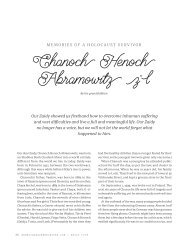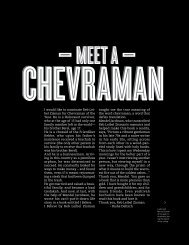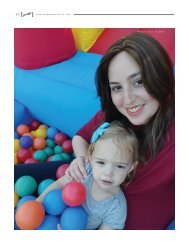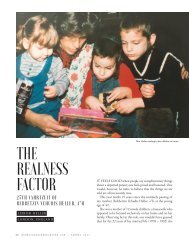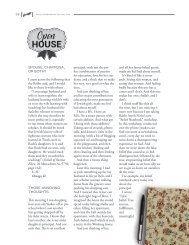mashpia pesach
Create successful ePaper yourself
Turn your PDF publications into a flip-book with our unique Google optimized e-Paper software.
ASEI<br />
LECHA<br />
RAV:<br />
Appoint for Yourself a Mashpia,<br />
PART II<br />
If you missed Part I, you can still read it on our website, nsheichabadnewsletter.com/archives.<br />
1A RAV’S<br />
PERSPECTIVE<br />
The Gemara says, “Ein adam choteh v’lo lo.” (A person does not sin if not<br />
for himself; if there is no personal gain). If you are having a hard time<br />
making a particular decision, it’s possible to convince yourself that your<br />
preferred approach is the right one, even when it’s not. Speaking to a<br />
friend can help clarify things.<br />
We all make for ourselves a “rav,” whether we realize it or not. Either<br />
it’s a real Rav, or it’s a friend, society, or an article you read online. If you<br />
don’t make for yourself a proper Rav,<br />
someone or something else will fill<br />
that void.<br />
A Rav is not only to help you make<br />
decisions, but also someone you<br />
report to. The words the Rebbe used<br />
were “mizman l’zman,” from time to<br />
time, to be in touch with the <strong>mashpia</strong>.<br />
When there is a guest in the<br />
house we act differently. Our fear<br />
of Hashem is not enough; we need<br />
a person to report to. Knowing that<br />
we have a <strong>mashpia</strong> who will question<br />
why we chose to do such-and-such<br />
helps keep us from giving in to the<br />
nefesh habahamis. Rav Yochanan<br />
said, if only we feared Hashem as<br />
much as we fear humans….<br />
Asei lecha rav. The term asei<br />
denotes a willful act – it is something<br />
that you have to make yourself<br />
do. When choosing a place to learn<br />
it says to learn in a place where<br />
your heart desires (makom shelibo<br />
chafetz). If you don’t want to be in<br />
a particular yeshivah you will not<br />
learn well there. You need to be<br />
happy where you are in order to learn.<br />
The same concept applies to <strong>mashpia</strong>.<br />
Choose someone you like as a<br />
<strong>mashpia</strong>, someone you’ll be happy<br />
to go to, who has the right character<br />
traits. You need to feel comfortable<br />
with the <strong>mashpia</strong> as a person.<br />
Speaking to a <strong>mashpia</strong> may not<br />
always be a totally pleasant experience.<br />
You may have to use willpower<br />
in the beginning. It is not so easy<br />
to humble yourself to someone, to<br />
open up and be honest, and accept<br />
feedback and guidance. But once<br />
you make yourself do it, you’ll be<br />
relieved.<br />
62 N’SHEI CHABAD NEWSLETTER | nsheichabadnewsletter.com
2<br />
A SHLUCHA’S PERSPECTIVE<br />
CHAYA GURARY<br />
Baltimore, MD<br />
I was first introduced to the idea of a <strong>mashpia</strong> and encouraged to get<br />
one when I was in eighth grade.<br />
At the time there were things that I wanted to do that my mother didn’t<br />
allow me to, but she told me that if I get a <strong>mashpia</strong> and she allows it, then<br />
she will let me. To me, that was my key to freedom, so I agreed to the idea.<br />
What was it that tipped the scale? I wanted to wear a certain type of skirt<br />
that my mother felt was inappropriate. I decided that I’ll get a <strong>mashpia</strong><br />
and she would certainly let me, and that way I’ll be able to do what I want...<br />
Honestly, I don’t remember what ended up happening with that skirt,<br />
if I was allowed to wear it in the end or not, but it was the beginning of<br />
many very special <strong>mashpia</strong> relationships.<br />
My older sister knew a girl and made the connection for me. I started<br />
out by speaking with her once in a while. We would drive around for at<br />
least an hour or two, discussing different topics, different questions... Back<br />
then it was a lot of discussions concerning clothing, relationships, etc. but<br />
slowly it became an incredible outlet and source of real inspiration for me.<br />
A couple of years later, still in high school, it was time for me to move<br />
on to another <strong>mashpia</strong>. I asked one of my Bnos Chabad leaders to be my<br />
<strong>mashpia</strong> and this time again I was fortunate to have someone invest herself<br />
in me, spending hours figuring out life with me. She even went so far<br />
as to prepare a little personalized “Megillah” with powerful thoughts for<br />
me to read each day I was away on Pesach vacation.<br />
After seminary, I felt it was time to move on and I only found a new one<br />
a few years into my marriage. Of course, I speak to my <strong>mashpia</strong> significantly<br />
less than I did to the other ones as we’re both busy mothers, wives<br />
and Shluchos, but for those times when I’m struggling with something and<br />
need the Rebbe’s guidance, I turn to the person the Rebbe instructed us to<br />
get for this purpose: my <strong>mashpia</strong>. I am incredibly lucky to have someone<br />
warm, understanding and smart who is able to shed light and a different<br />
perspective, guiding me in the proper direction. I take this opportunity<br />
to deeply thank each of my mashpios for all that they invested in me. I<br />
hope I can now give back to others that which I received.<br />
WE WOULD<br />
DRIVE AROUND<br />
FOR AT LEAST<br />
AN HOUR OR<br />
TWO, DISCUSS-<br />
ING DIFFERENT<br />
TOPICS<br />
If I look back at the different experiences<br />
that I had throughout my life,<br />
and have to choose what it was that<br />
gave me the most in my Yiddishkeit<br />
and chassidishkeit, I have to say it<br />
was having a <strong>mashpia</strong>; having someone<br />
I looked up to, that I could relate<br />
to and talk to openly and comfortably,<br />
without being afraid of being<br />
judged or ridiculed for having such<br />
thoughts and questions.<br />
APRIL 2014<br />
63
3<br />
“YOU HAVE CERTAIN<br />
GOALS THAT YOU WANT<br />
TO ACHIEVE”<br />
MRS. YOCHEVED BAITELMAN<br />
Crown Heights<br />
WHAT CAN YOU SHARE WITH ME ABOUT THE REBBE’S REQUEST<br />
TO GET A MASHPIA?<br />
The Rebbe expressed a heartfelt request, a bakashah nafshis, with regards<br />
to asei lecha rav, meaning to get ourselves a <strong>mashpia</strong>. “Please do me a<br />
favor.” We’d all be happy to do the Rebbe a favor, right?<br />
As the Rebbe said (Chol Hamoed Sukkos 5747, Oct. 19, 1986), “Every<br />
person must find a mentor and seek their advice on personal matters. …<br />
And out of love for your fellow Jew, encourage others to find their own<br />
mentor, as well.”<br />
Each of us has to have a Rav to pasken sha’alos, aside from a <strong>mashpia</strong>.<br />
WHAT ARE QUALITIES THAT ARE IMPORTANT TO LOOK FOR WHEN<br />
CHOOSING A MASHPIA?<br />
It should be someone with whom you’re comfortable to speak and discuss<br />
things.<br />
You’re not signing a contract with one person. The idea of a <strong>mashpia</strong> is<br />
not to make big decisions yourself.<br />
The Rebbe often encouraged people to get a second medical opinion. I<br />
think with your own life questions, at least get one opinion!<br />
It’s important to note that a <strong>mashpia</strong> is not a Rav or a posek. A <strong>mashpia</strong><br />
is not someone who tells us what to do, but someone who helps us gain<br />
clarity. A <strong>mashpia</strong> can also guide you when and how to ask a Rav a shailah.<br />
Only a Rav gives a psak.<br />
HOW OFTEN SHOULD ONE SPEAK TO A MASHPIA?<br />
A <strong>mashpia</strong> is someone you speak to regularly, not just when there is a big<br />
problem. If you find that there are<br />
certain things that you keep thinking<br />
about, rather than letting them<br />
clog your brain, speak to a <strong>mashpia</strong>.<br />
When speaking to a <strong>mashpia</strong> you<br />
have to ask yourself, “Am I ready<br />
to deal with it?” You have to have<br />
the feeling that you are ready to do<br />
something about the situation.<br />
My father, Rabbi Sholom Gordon<br />
a”h, told us: “We learn from<br />
the laws of bedikas chometz. You<br />
do not search for chometz in your<br />
neighbor’s house. You only search on<br />
your own property. Chometz represents<br />
undesirable traits. We search<br />
for it in ourselves, not in our loved<br />
ones.” So when speaking to a <strong>mashpia</strong><br />
about a sholom bayis issue, for<br />
example, you are going to be asking,<br />
“What can I do to make my marriage<br />
better?” How can I change myself,<br />
my behavior?<br />
If a <strong>mashpia</strong> is giving you guidance<br />
or advice, you should at least<br />
make an effort to follow through<br />
on her suggestions. You can’t use a<br />
<strong>mashpia</strong> to talk, talk and talk, if you<br />
have no intention of actually doing<br />
something.<br />
When a person calls me and then<br />
doesn’t do even one thing from the<br />
advice given, I don’t have the energy.<br />
This is my feeling. But others don’t<br />
mind just listening.<br />
CAN YOU SHARE YOUR EXPERI-<br />
ENCE WITH FINDING A MASHPIA<br />
FOR YOURSELF, OR ANY DIFFI-<br />
CULTIES YOU MAY HAVE HAD,<br />
OR RESERVATIONS, WHEN THE<br />
REBBE FIRST CAME OUT WITH<br />
THE HORA’AH?<br />
Right away I took on more than<br />
one <strong>mashpia</strong>. I felt that one person<br />
could not give me answers with<br />
regard to all my life issues. The<br />
person I would speak to regarding<br />
chinuch, strengthening Chitas<br />
and improving in tznius, wasn’t the<br />
same person who I would turn to<br />
64 N’SHEI CHABAD NEWSLETTER | nsheichabadnewsletter.com
with advice on the day-to-day, physical aspects of raising my children.<br />
Choose someone with whom you can have a good relationship. Of<br />
course, she should be a good, frum person, with hiskashrus, someone<br />
who has a lifestyle you’d like to emulate. Someone who treats her husband<br />
and children with respect – this is a TOP priority. A <strong>mashpia</strong> should be<br />
someone with good middos, who acts in a chassidishe and respectful way.<br />
You have certain goals that you want to achieve. For example, maybe<br />
you have challenges getting your children out on time in the morning.<br />
So speak to people who do get their kids out on time in the morning. Find<br />
out how they do it.<br />
HOW DO I FIND A MASHPIA?<br />
For a newcomer to Crown Heights, I would say stick with the person<br />
you knew before you came here. Maybe eventually they could make an<br />
introductory call for you. If someone is new in town and wants to rent<br />
an apartment, the landlord will ask for references. Who is this person,<br />
is she trustworthy, who are her friends? A <strong>mashpia</strong> who gets a cold call,<br />
from someone she doesn’t know, may do the same. She will ask around,<br />
who is this person?<br />
If people who already know you introduce you to a new local <strong>mashpia</strong>,<br />
it makes a big difference. They can say to the new <strong>mashpia</strong>, “I know<br />
this woman, and she is trustworthy and sincere about her Yiddishkeit.”<br />
The <strong>mashpia</strong> has to connect with you too. It’s not a one-way street. She<br />
has to feel comfortable talking to you.<br />
IS PAYING A MASHPIA SOMETHING THAT IS EXPECTED?<br />
No, I do not think a <strong>mashpia</strong> should be paid.<br />
If someone chooses to give a gift, I think that’s acceptable, but not<br />
required.<br />
I do want to say, though, that one should pay a Rav, even if he doesn’t<br />
charge. This is his parnassah. If you don’t send a check on Chanukah or<br />
Purim, then certainly send one when selling chometz.<br />
I FEEL BAD ASKING SOMEONE SO BUSY, IMPORTANT, WITH LOTS<br />
OF RESPONSIBILITIES, TO BE MY MASHPIA.<br />
Either they’ll want to or they won’t want to. Take all the Shluchos, they<br />
live their lives helping people. Some people go on mivtza’im, some are<br />
mashpiim. You have to find someone who wants to do it, but don’t get<br />
stuck on someone who doesn’t want to do it.<br />
WHAT DO YOU THINK OF HAVING FAMILY MEMBERS BE ONE’S<br />
MASHPIA?<br />
If you feel that you can have an honest relationship, it’s fine. I know people<br />
who have family members as a <strong>mashpia</strong>, and it has been very successful<br />
for 20 years, ever since the Rebbe asked for it.<br />
You have to know what your relationship with the person is. Know how<br />
they look at you and how they perceive you…<br />
THE PEOPLE I RESPECT, I FEEL INTIMIDATED TALKING TO, AND<br />
FOR THE PEOPLE I FEEL COMFORTABLE TALKING TO, I DON’T HAVE<br />
THAT SORT OF RESPECT.<br />
Sometimes, we put people on a pedestal, especially if you heard they are<br />
good at something that’s an issue for you. But when you talk to them, you’ll<br />
Mrs. Yocheved Baitelman<br />
see they are really approachable.<br />
If you know someone has expertise<br />
in a certain issue, call her, even<br />
if you feel a little intimidated by her.<br />
Ask about a subject you know she<br />
is comfortable with and can discuss<br />
easily. Who knows, she may turn out<br />
to be your <strong>mashpia</strong>….<br />
A word to mashpios: a <strong>mashpia</strong><br />
shouldn’t impose on someone else<br />
standards that she does not keep<br />
herself.<br />
APRIL 2014<br />
65
4<br />
“A MASHPIA IS NOT<br />
A REPLACEMENT FOR<br />
THINKING”<br />
RABBI MANIS FRIEDMAN<br />
WHAT IS THE DIFFERENCE BETWEEN A MASHPIA AND A THERAPIST?<br />
First of all, a <strong>mashpia</strong> is not a doctor. The role of a <strong>mashpia</strong> is not to help<br />
people with depression or emotional problems. A <strong>mashpia</strong> is for when you<br />
need to know the right thing to do.<br />
So maybe I should note, the <strong>mashpia</strong> should notice when the person is<br />
listening or growing from what he or she is teaching, or if the person has a<br />
serious problem and is not taking it in. If the person can’t listen, can’t hear,<br />
can’t receive, then there might be a need for professional help. But as long<br />
as the person is open and eager for guidance, then a <strong>mashpia</strong> can guide.<br />
SO WHO CAN BE A MASHPIA?<br />
Someone who is a little wiser than you, somebody whose standard of mitzvos<br />
and chassidishe sensitivity is a little better than your own, so they<br />
can elevate you to their level.<br />
Everybody has a yetzer hara, everyone has their weaknesses. It doesn’t<br />
have to be top secret.<br />
You can trust a <strong>mashpia</strong> that they’re mature enough not to go spreading<br />
lashon hara. And unfortunately there is no guarantee. But I think people<br />
know to be cautious and to trust their instinct. If you feel a person is not<br />
trustworthy then don’t go there. To exclude everybody, to say I can’t talk<br />
to anyone, I can’t have a <strong>mashpia</strong> because the <strong>mashpia</strong> might think something<br />
[negative] of me, that’s going too far.<br />
CAN YOU HAVE MORE THAN ONE MASHPIA?<br />
Sure. Just don’t go to different mashpiim with the same question. But if<br />
you have certain mashpiim who help<br />
you with family things, you have<br />
mashpiim who help you with learning<br />
Chassidus, etc., I think that’s<br />
perfectly okay. A <strong>mashpia</strong> is not a<br />
marriage. But to ask two mashpiim<br />
the same question, that’s like asking<br />
two Rabbonim the same question.<br />
You come to a <strong>mashpia</strong> because<br />
you want to be better. If you are<br />
capable of growing and capable of<br />
taking advice, then you are capable<br />
of becoming better. So you go<br />
to a <strong>mashpia</strong> and you say, “Will you<br />
please help me grow to the next level<br />
that I need to be on, either in learning<br />
or hiddur mitzvah or...”<br />
One should go to a <strong>mashpia</strong> if one<br />
has a problem with sholom bayis,<br />
but is open to improvement, and<br />
wants to know how to make the<br />
marriage better – not to come and<br />
kvetch and complain about his or<br />
her spouse. The <strong>mashpia</strong> is not a<br />
marriage counselor. You come to a<br />
<strong>mashpia</strong> because you think you can<br />
do better, you just need some support<br />
and advice.<br />
WHAT ABOUT FAMILY MEMBERS<br />
BEING ONE’S MASHPIA?<br />
I think a close relative is not a good<br />
idea. You need someone who can be<br />
objective about your matzav. People<br />
who are too close to you may have<br />
the same problems you have. They<br />
can’t be objective. They’re either<br />
too critical or too lenient.<br />
WHAT IF YOU FEEL YOUR MASH-<br />
PIA IS NOT GIVING GOOD<br />
ADVICE? SHOULD YOU FORCE<br />
YOURSELF TO LISTEN OUT OF<br />
KABBALAS OL?<br />
If you don’t trust your <strong>mashpia</strong>,<br />
then you don’t have one. Asking a<br />
<strong>mashpia</strong> is like asking the Rebbe,<br />
because the Rebbe says if you want<br />
my answer ask a <strong>mashpia</strong>. So the<br />
<strong>mashpia</strong> is b’hashgachah protis<br />
telling you what you need to hear.<br />
66 N’SHEI CHABAD NEWSLETTER | nsheichabadnewsletter.com
Rabbi Manis Friedman<br />
If you are not ready to trust him enough to do it, and you’re just looking<br />
for advice that appeals to you, you are not really looking for a <strong>mashpia</strong>,<br />
you are looking for approval. When you talk to a <strong>mashpia</strong>, it has to be<br />
like looking up something in Shulchan Aruch. That’s what it says, that’s<br />
what you do.<br />
That’s the challenge – to have that kind of willingness. Otherwise you<br />
never get out of your box. A <strong>mashpia</strong> should be able to push you beyond<br />
your comfort zone.<br />
WHAT ABOUT BOTHERING SOMEONE WHO IS BUSY? THERE IS<br />
A CONCERN THAT YOU WILL BE WASTING THEIR TIME. ALSO,<br />
IS THERE A CERTAIN FREQUENCY WHICH ONE IS MEANT TO BE<br />
SPEAKING TO ONE’S MASHPIA?<br />
You can’t make a rule about frequency. Being considerate of a <strong>mashpia</strong>’s<br />
time is very thoughtful, very correct. So don’t just carry on and take up<br />
a lot of unnecessary time.<br />
Present your question clearly. Maybe even write it down before, and<br />
get to the point, because the main thing is to get instruction. You get your<br />
instruction, you go and you do. No debating, discussing and analyzing.<br />
It’s guidance. Guidance shouldn’t take that much time. More than an hour<br />
at a time would be very inconsiderate.<br />
You can let the <strong>mashpia</strong> decide how often you should be speaking, if<br />
there is a need for another conversation or follow up.<br />
WHAT ABOUT DEVELOPING A HEALTHY SENSE OF TRUSTING ONE-<br />
SELF, NOT ALWAYS RUNNING TO A MASHPIA?<br />
Well, if you remember, the Rebbe advised a number of things. If you have<br />
financial business problems or questions, talk to yedidim u’mevinim,<br />
friends who understand business.<br />
If you have a question with health, talk to a rofeh yedid.<br />
If you have a question regarding yeshivah, talk to the hanhalah of a yeshivah.<br />
You don’t run to the <strong>mashpia</strong> with<br />
every question. You go to a <strong>mashpia</strong><br />
because you want to be better. Better<br />
middos, more yiras Shomayim,<br />
you want to understand Chassidus<br />
better. That’s what you go to a<br />
<strong>mashpia</strong> for.<br />
It’s not like you can’t make up your<br />
mind about things so you ask your<br />
<strong>mashpia</strong> everything. Even when you<br />
ask your friends about business or a<br />
doctor about health, it doesn’t mean<br />
that you can’t trust your own wisdom.<br />
It means you have a question. A <strong>mashpia</strong><br />
is not a replacement for thinking.<br />
I mean, people wouldn’t write to<br />
the Rebbe with business questions<br />
unless they really had a question.<br />
Anything they thought they could<br />
handle themselves, they did.<br />
WHAT’S OUR OBLIGATION OR<br />
RESPONSIBILITY IN TERMS OF<br />
BEING MASHPIA ON OTHERS?<br />
WHAT IF SOMEONE ASKS ME<br />
TO BE THEIR MASHPIA, BUT I<br />
DON’T THINK I AM “MASHPIA<br />
MATERIAL”?<br />
If you really don’t think you can do<br />
it, you must be honest about it; not<br />
everyone is cut out to be a <strong>mashpia</strong>.<br />
If they are really persistent, they’ll<br />
wear you down and you’ll agree, but once<br />
you agree you have to take it seriously.<br />
We’re always either being influenced<br />
or doing the influencing. So<br />
we’re being <strong>mashpia</strong> whether we<br />
know it or not. To be a formal <strong>mashpia</strong>,<br />
you need to wait until you’re<br />
asked. But once you’re asked, you<br />
have to take the responsibility.<br />
The Rebbe once said by a farbrengen<br />
the <strong>mashpia</strong> doesn’t wait for the<br />
mushpa to call him. He picks up the<br />
phone and calls him, but that’s after<br />
you become a <strong>mashpia</strong>. You don’t<br />
go recruiting.<br />
To hear or read more of Rabbi Manis<br />
Friedman, please visit<br />
itsgoodtoknow.com.<br />
APRIL 2014<br />
67
5<br />
“DON’T LOOK FOR<br />
PERFECT”<br />
RABBI AVROHOM LIPSZYC<br />
Many years ago, Rabbi Binyomin Klein related the following story.<br />
A bochur asked the Rebbe for permission to go to college, and wrote that<br />
he had received permission from his Rav. The Rebbe called in Rabbi Klein<br />
and asked him to find out from the Rav what his reasoning was for giving<br />
the bochur permission to go to college. The bochur’s Rav responded,<br />
“He is going to go anyway, so what would be the point of my telling him<br />
no?” The Rebbe was very upset and told the bochur that he should disregard<br />
that Rav’s advice.<br />
I have witnessed such scenarios, in which the asei lecha rav became<br />
the blind leading the blind…<br />
What is the solution? Should we choose our <strong>mashpia</strong> more wisely? What<br />
is the Rebbe’s directive of asei lecha rav?<br />
The Rebbe first spoke about getting a <strong>mashpia</strong> on Shabbos parshas<br />
Devarim, 5746, and repeated this instruction many times in the following<br />
weeks. In the first sichah the Rebbe said, “In addition to the teaching,<br />
‘Who is wise, he who learns from every person,’ there is the teaching to<br />
make yourself a rav…<br />
“Even if you are a gadol in yiras Shomayim and Torah knowledge, and<br />
cannot find someone above you, take someone beneath you, for a person<br />
cannot see for himself the advice that one can see for the other.<br />
“The term ‘asei’ denotes forcing oneself, and it being difficult.”<br />
A CLASSIC OBSTACLE TO ASEI LECHA RAV<br />
In a chassidishe cheder, there is a beautiful emphasis on the holiness<br />
and perfection of all tzadikim, and thus, all our heroes and mentors from<br />
childhood are to us perfect and larger<br />
than life. In early childhood, our<br />
parents, grandparents, and older<br />
siblings are perfect in our eyes; they<br />
know and can do everything. Then,<br />
as we grow older, we have counselors<br />
and head counselors whom we<br />
idolize, as well as teachers, principals,<br />
and mashpiim. Eventually, we<br />
see that our parents and indeed just<br />
about everyone is only human. Tzadikim<br />
are so rare, as Tanya explains,<br />
that Hashem had to place a few in<br />
every generation, because we can’t<br />
live without them. To see our mentors<br />
and people that we look up to<br />
as anoshim k’erkeinu, people of our<br />
caliber, can be shattering, and sometimes<br />
this can lead to a loss of trust<br />
in any rav.<br />
This should not be!<br />
I recall so vividly begging not to<br />
hear lashon hara about one of my<br />
mentors, thinking to myself that I<br />
just couldn’t afford to be crushed<br />
and lose yet another giant in my life.<br />
This, to me, is one of the most<br />
classic obstacles to asei lecha rav,<br />
to us making for ourselves a rav.<br />
And it’s the yetzer hara all the way.<br />
But when looking for a rav, aren’t<br />
we supposed to find the most chassidishe,<br />
wise, and respected individual<br />
we know?<br />
I suggest not!<br />
WHAT IS A SPONSOR?<br />
In addiction recovery programs,<br />
a primary tool without which one<br />
cannot achieve recovery is to have<br />
a sponsor. The saying goes, “If you<br />
work the steps by yourself, without<br />
a sponsor except for yourself, you<br />
have a fool for a sponsor.”<br />
Well, who is this sponsor? He or<br />
she is a recovering addict, who has<br />
been where the sponsee is, and has<br />
worked the Twelve Steps, thus having<br />
an understanding of the steps.<br />
So, the requirements to be a<br />
68 N’SHEI CHABAD NEWSLETTER | nsheichabadnewsletter.com
Rabbi Avrohom Lipszyc<br />
sponsor are a) an addict (addicts never stop being addicts, however, they<br />
can be in recovery), b) has sobriety, and c) knows how, and has himself<br />
or herself worked the steps.<br />
Wow! What a surprise to me! The only reason a sponsor can be a sponsor<br />
is because he or she is as “crazy-wired” as the sponsee! In recovery<br />
a sponsee will often tell his sponsor, “Yes, you earned the right to be my<br />
sponsor, you are crazy enough!”<br />
Together with this, the sponsor must have recovery time, and not be<br />
part of the “captured who cannot free themselves.” He must have what<br />
the sponsee wants to have, a healthy recovery, and he must have a clear<br />
understanding of the process which leads from the insanity of addiction<br />
to the sobriety of recovery.<br />
When I learned of this, I began to have a whole new understanding of<br />
the Rebbe’s directive to asei lecha rav, and understand who I am looking<br />
for, and why and how I can trust him.<br />
FINDING A RAV<br />
In finding a rav, it may be best to take the same approach as addicts in<br />
recovery do in finding a sponsor. It isn’t about who he or she may be<br />
according to conventional wisdom, as in very chassidish, brilliant, or the<br />
like. Most questions one would ask one’s rav don’t require holiness or brilliance<br />
as much as they require experiential wisdom and understanding.<br />
The mushpa needs to see in the eyes of the rav an understanding of the<br />
chaos, the pain, and the fear. The following story was once told by the<br />
Rebbe at a farbrengen (Sukkos, 5711). As a child, the Rebbe Rashab was<br />
playing Rebbe/chossid with his<br />
brother, Reb Zalman Aharon (Raza).<br />
The Rashab refused to play “Rebbe,”<br />
because he said, “There is only<br />
one Rebbe [their grandfather, the<br />
Tzemach Tzedek].” So the Rashab<br />
played chossid, and Raza played<br />
Rebbe. The little “chossid” told the<br />
“Rebbe” about a deficiency in his<br />
avodas Hashem, and the “Rebbe”<br />
gave advice on how to correct it.<br />
After hearing his response, the<br />
Rashab told his brother, “You are<br />
not a Rebbe!”<br />
“Why not?” asked Reb Zalman<br />
Aharon.<br />
The Rebbe Rashab answered, “A<br />
Rebbe would give a sigh first before<br />
replying.”<br />
However, of what use is<br />
a krechtz without understanding<br />
the way back home? Thus, the<br />
criterion of the rav is his understanding<br />
of Yiddishkeit, Chassidus,<br />
and the Rebbe’s view of living life.<br />
Here again, not just understanding<br />
from the mind or heart, but from<br />
the ”m’bsorai echzah – from my<br />
own flesh do I see.”<br />
JUST DO IT!<br />
Don’t look for perfection. Instead,<br />
find someone who travels a journey<br />
of life similar to yours, who lives<br />
the life you wish to live. Ask him<br />
for his telephone number and if it<br />
is okay one evening or on a Sunday<br />
to sit down and talk. Feel comfortable<br />
little by little, and then just do<br />
it, by asking him if he is willing to<br />
be your rav. Then, I would suggest<br />
that you go to the Ohel and notify<br />
the Rebbe, and ask for help, guidance,<br />
and a blessing for willingness<br />
to be open to what the <strong>mashpia</strong> will<br />
tell you to do.<br />
Rabbi Avrohom Lipszyc is a Shliach<br />
in North Miami, Florida, and director<br />
of HaChaim: The Life Institute.<br />
APRIL 2014<br />
69
6<br />
MYSHLIACH<br />
MRS. ELKY RAITPORT<br />
EVEN CHILDREN NEED TO HAVE A MASHPIA!<br />
Every child should have a <strong>mashpia</strong>. Children can also be <strong>mashpia</strong> on others,<br />
as evidenced from this quote from the Rebbe:<br />
“… In order for the mashpiim to be effective, they must be filled with a<br />
spirit of ahavas Yisroel, and therefore a special printing of Kuntres Ahavas<br />
Yisroel will be printed for the mashpiim. A special kuntres will also<br />
be published for children with sayings about ahavas Yisroel which will be<br />
on a child’s level, starting with the saying: “Love your fellow as yourself;<br />
Rabbi Akiva said, this is a great principle of the Torah,” which is one of<br />
the Twelve Pesukim. This kuntres will be given to those children who are<br />
mashpiim, and it will definitely give added success to their work. (This<br />
excerpt is taken from To Love a Fellow Jew, published by SIE, compiled<br />
and translated by Rabbi Nissan Dovid Dubov.)<br />
Eight-year-old Mendy Zaklas of Zagreb, Croatia, spends lots of time<br />
playing piano, experimenting and sounding out his favorite Lubavitcher<br />
niggunim. His twin sister Dina and younger siblings Hinda and Yehuda<br />
serve as his devoted sounding board, audience and cheering squad as<br />
he entertains them with his lively concerts during many an afternoon.<br />
“I have lots of friends,” Mendy tells me, referring to the many of Zagreb’s<br />
6,000 Jews that have come through the Zaklases’ doors. As for likeminded<br />
peers, though, the nearest ones live in Vienna, four and a half hours away<br />
by car. And then there’s Shneor. He’s just a phone call away.<br />
“Shneor is my MyShliach friend,” Mendy explains, describing the<br />
21-year-old bochur whose Sunday afternoon phone calls he anticipates<br />
all week long. “He tells the most interesting stories, like the ones from<br />
Bosi L’Gani, but what I enjoy most<br />
is learning Hayom Yom with him.”<br />
With this year marking 70 years<br />
since the publication of Hayom Yom,<br />
Shneor makes a point of discussing<br />
a selection with Mendy during every<br />
conversation. “I don’t necessarily<br />
choose the Hayom Yom’s entry of<br />
that particular day,” he explains.<br />
“I choose an entry of the upcoming<br />
week that can easily be read and<br />
[forgotten] without a person finding<br />
specific inspiration within it,<br />
and introduce Mendy to the layers<br />
of meaning and personal teachings<br />
that can be found upon digging just<br />
a little deeper.”<br />
Mrs. Raizel Zaklas adds, “MyShliach<br />
provides something so essential<br />
to the life of a child on Shlichus and<br />
even to his parents. The need for each<br />
child to have a <strong>mashpia</strong>, someone<br />
to lovingly encourage him to follow<br />
the right path through a one-on-one<br />
connection, reflects our need, as<br />
well. MyShliach is a weekly boost<br />
that keeps us all going.”<br />
“An incredible amount of Mendy’s<br />
Chassidishkeit can be credited to<br />
MyShliach,” Rabbi Pinny Zaklas<br />
agrees.<br />
Launched in 5766 for a pilot group<br />
of 50 boys, MyShliach’s Ach/Achos<br />
Sheli program was created to connect<br />
yaldei hashluchim around the<br />
world with “big brother” figures for<br />
weekly, hour-long one-on-one sessions<br />
of learning and farbrenging.<br />
Expanding one year later to include a<br />
girls’ track, the program has served<br />
as a veritable lifeline for over 1,000<br />
yaldei hashluchim spanning 150 cities<br />
throughout 20 countries.<br />
“Though MyShliach does provide<br />
learning resources to the<br />
mentors, there is no set curriculum,”<br />
explains girls’ coordinator<br />
Mrs. Malkie Wilshansky. “When<br />
registering, parents are able to specify<br />
how they’d like the <strong>mashpia</strong> to<br />
70 N’SHEI CHABAD NEWSLETTER | nsheichabadnewsletter.com
spend his or her time with their child. For some, the focus is on reviewing<br />
a possuk Chumash, learning a new perek of mishnayos, or tackling<br />
a sichah. For others, the Ach/Achos Sheli is simply about a listening ear<br />
and an inspirational role model.”<br />
But regardless of how the time is spent, a kesher is built. “We’ve had<br />
chavrusas stay in touch for more than five years,” exclaims director Rabbi<br />
Mendy Shanowitz. “Bochurim have flown in to attend the bar mitzvahs<br />
of ‘their children’ and children have traveled to the weddings of their<br />
mashpiim. Recently, chavrusas Yaakov Landau of Thornhill, Ontario, and<br />
Meir Shlomo Gordon of London, England, celebrated a siyum marking<br />
the conclusion of their learning the entire Kitzur Shulchan Aruch over<br />
the course of three years!<br />
“We’re constantly in touch with the parents,” says Rabbi Shanowitz,<br />
who encourages parents to call right away if any concerns arise. The Ach/<br />
Achos Sheli program is just one of the many resources that MyShliach<br />
provides for children of Shluchim, in keeping with its motto of “caring<br />
for the wellbeing of the children of Shluchim.”<br />
For more information, visit www.myshliach.com or call 718-467-4400 x 338.<br />
MyShliach is a project of Merkos L’Inyonei Chinuch.<br />
Zaklas Family<br />
7<br />
THERAPIST VS. MASHPIA<br />
MRS. ALIZA HOROWITZ<br />
THERAPIST VS. MASHPIA<br />
Everyone in this world faces challenges<br />
in life and needs help to<br />
understand and solve them. Therapy<br />
may be helpful depending on<br />
the scope of the problem and the<br />
sensitivities of the person. The following<br />
case study highlights the<br />
unique contributions of the therapist.<br />
Names and details have been<br />
changed to protect of the privacy<br />
of the patient.<br />
Shayna grew up in an out-oftown<br />
Chabad community. She was<br />
the sixth of seven siblings. When<br />
Shayna was five years old, her maternal<br />
grandmother died in a tragic<br />
accident, leaving Shayna’s mother,<br />
Esther, in shock. Esther became<br />
seriously depressed and unable to<br />
APRIL 2014<br />
71
care for her young daughter.<br />
Shayna’s father took<br />
over the functioning of the<br />
home while holding down a<br />
full-time job. Although during<br />
this time Shayna’s basic<br />
needs were taken care of,<br />
she was deeply impacted<br />
by her mother’s inability<br />
to nurture her, and began<br />
to retreat into herself. The<br />
children at school teased her<br />
and shunned her for her odd<br />
behavior. Shayna began to<br />
feel lonely and unlovable.<br />
Although Shayna’s mother<br />
eventually recovered from<br />
Mrs. Aliza Horowitz<br />
her grief and was able to<br />
function well again, something<br />
inside of Shayna did not spring back. The feeling that “there is<br />
something wrong with me” was always there like a wound that does not heal.<br />
At age 21 Shayna moved to Crown Heights. Once she settled into the<br />
community she found an older woman to be a role model and a <strong>mashpia</strong>.<br />
Mrs. Cohen was compassionate and understanding. Together they learned<br />
the Rebbe’s teachings about marriage and bitachon. They talked regularly<br />
and Shayna tried hard to implement Mrs. Cohen’s advice. Although<br />
Shayna threw herself into her work of teaching preschool and learning<br />
Torah, she couldn’t shake the increasingly overwhelming feelings that<br />
were welling up inside of her. She was unable to concentrate at work, cried<br />
for no apparent reason, and no longer enjoyed the things she had always<br />
liked to do. When Shayna stopped calling for several weeks, Mrs. Cohen<br />
became alarmed. At this point she urged Shayna to get professional help.<br />
Shayna was 23 years old when she came to me for her first therapy<br />
session. She was very sad and felt she was at the end of her rope. When<br />
Shayna and I began working we had to address the pain that she had<br />
tried hard to avoid feeling. She needed to examine and explore the feelings<br />
and thoughts that were overwhelming her. To help her be able to do<br />
that, she had to learn some skills that would make it tolerable. Slowly we<br />
built a trusting relationship and created a therapeutic space where she<br />
could go back and work through the deeper issues that resulted from the<br />
trauma of her mother withdrawing emotionally at an important developmental<br />
stage.<br />
This case is an example of the difference between the role of a <strong>mashpia</strong><br />
and that of a therapist. Both are committed to the person developing to<br />
their full potential. A <strong>mashpia</strong> helps a person see her spiritual blind spots,<br />
and for many people this is all that is needed. Therapists have expertise<br />
in the treatment of emotional disorders through the use of therapeutic<br />
techniques. The therapist steps in when there are deeper problems that<br />
are blocking the person from being able to function in one or more important<br />
areas of life, such as home, work, or relationships. The work of the<br />
<strong>mashpia</strong> and the therapist can be<br />
complementary, as in the case above,<br />
where the <strong>mashpia</strong> saw that Shayna<br />
needed an additional kind of help.<br />
Psychotherapy is more than talking<br />
about problems, more than encouragement<br />
and more than giving good<br />
advice. Through clinical intervention<br />
and the interactions in this unique<br />
relationship – which exists solely<br />
for the benefit of the person seeking<br />
help – symptoms can be relieved<br />
and problems in living solved.<br />
Mrs. Aliza Horowitz is a Licensed<br />
Mental Health Counselor (LMHC)<br />
living and working in Crown Heights.<br />
72 N’SHEI CHABAD NEWSLETTER | nsheichabadnewsletter.com
8<br />
“TRUST DEVELOPS<br />
SLOWLY”<br />
MRS. BRONYA SHAFFER<br />
Crown Heights<br />
WHO SAYS I NEED ADVICE?<br />
It’s impossible for a person to go through life without ever needing to ask<br />
anyone anything – decorating advice, cooking advice, financial advice,<br />
marriage advice...<br />
The Rebbe said that a <strong>mashpia</strong> is someone you check in with specifically<br />
in the areas of Torah, tefillah and tzedakah. A <strong>mashpia</strong> is someone<br />
you are accountable to.<br />
This is something that the world recognizes is a helpful thing. We see<br />
this today with Weight Watchers, or Alcoholic Anonymous - people have<br />
a sponsor.<br />
The Rebbe didn’t say a <strong>mashpia</strong> is only for people who didn’t go to<br />
yeshivah, or for people who don’t know so much, or for people who are<br />
not so chassidish. I think the underlying unsaid theme here is: Everybody<br />
needs someone to speak to.<br />
WHO SAYS A MASHPIA IS SO SMART, AND WHY SHOULD SHE<br />
BE SO POWERFUL?<br />
Sometimes someone calls me and asks something. I tell them, let me think<br />
about this, I will discuss this with my <strong>mashpia</strong>, who will often tell me she<br />
needs to discuss it with her <strong>mashpia</strong>…<br />
It’s quite a wondrous thing.<br />
It is clear that <strong>mashpia</strong>-mushpa is a unique relationship. Once, when<br />
my daughter was working and also going to school, I saw her sitting at<br />
the table late one night, half asleep.<br />
I say to her, “Why don’t you go to bed?”<br />
She said, “I can’t; I didn’t learn Chitas yet.”<br />
“So learn Chitas,” I said.<br />
“I’m too tired,” she replied.<br />
As a mother, I have rachmanus,<br />
I tell her, go to sleep, and you’ll do<br />
Chitas tomorrow. As a mother this<br />
is a totally appropriate response.<br />
A <strong>mashpia</strong>, on the other hand,<br />
may tell her, if you stop one day, it<br />
opens the door for stopping another.<br />
Push yourself, and do it.<br />
HOW DOES SOMEONE<br />
DEVELOP A RELATIONSHIP<br />
WITH A MASHPIA?<br />
Slowly. Calling a <strong>mashpia</strong> isn’t like<br />
calling a dentist: Make an appointment,<br />
take an X-ray, have a cavity<br />
filled, done. If one speaks with someone<br />
regularly, a relationship will<br />
develop naturally.<br />
WHAT ARE QUALITIES TO<br />
LOOK FOR IN A MASHPIA?<br />
Someone older, with more life<br />
experience.<br />
Someone whom you trust.<br />
Someone whose opinions you<br />
respect.<br />
HOW DO YOU KNOW IF A<br />
MASHPIA IS TRUSTWORTHY?<br />
Trust develops slowly. It’s like asking,<br />
how do you trust a pharmacist?<br />
We patronize pharmacies with a reputation<br />
that’s earned them the public<br />
trust. It doesn’t happen instantly;<br />
trust is built and earned. You will<br />
seek out a <strong>mashpia</strong> whom you know<br />
– by reputation – to be trustworthy,<br />
and then as you get to know her, the<br />
trust will build.<br />
Nobody can live life without trusting<br />
anyone at all.<br />
When trust is betrayed it’s very<br />
painful.<br />
The single most important point<br />
to keep in mind, while finding the<br />
right <strong>mashpia</strong>: You have to know<br />
the information you are disclosing<br />
won’t go anywhere.<br />
If you are a <strong>mashpia</strong>, when someone<br />
tells you something, you have<br />
an ethical and moral responsibility,<br />
as well as a halachic responsibility,<br />
APRIL 2014<br />
73
to maintain confidentiality.<br />
When someone discloses something personal, it doesn’t belong to you.<br />
You don’t have the right to tell it to anyone else. This is personal integrity.<br />
Speak with someone you trust who will not betray your confidence. Here’s<br />
a hint: If a <strong>mashpia</strong> shares personal information about others with you,<br />
it’s quite likely that she is sharing your personal information with others.<br />
People who come to a <strong>mashpia</strong> need to be assured in words that everything<br />
discussed will be kept confidential. This is especially important<br />
to say to younger people, unless there is a danger. In that case I will call<br />
your parents, but I will tell you first that I am calling.<br />
If someone shares suicidal thoughts, for example, I will have to speak<br />
with someone. If I see a closet eating disorder, I have to speak up. But<br />
the same applies. I tell the person that I am making this call because her<br />
life is in danger.<br />
Even in friendships, if a friend tells you “swear to me” and then discloses<br />
something terrible that she did, I am not going to tell. But if they say some<br />
suicidal or potentially harmful things, then I will have to tell someone.<br />
WHAT IF IT’S EMBARRASSING FOR A PERSON TO SPEAK<br />
WITH A MASHPIA?<br />
Embarrassment can become like a prison and cripple you. It’s a selfimposed<br />
disability.<br />
Embarrassment is a sense of shame.<br />
A strong sense of shame doesn’t allow us to create strong relationships.<br />
Shame is, “I don’t think I am worthy enough for someone to take<br />
time and effort on my behalf. If I allow myself to be too vulnerable, the<br />
person will think less of me.”<br />
Shame is also the inability to accept our inadequacies. If I have to name<br />
one emotion which keeps us from being involved in healthy satisfying<br />
relationships, it is shame.<br />
WHAT IF MY MASHPIA MAKES ME FEEL INADEQUATE? LESS<br />
THAN…?<br />
First of all, no one can make you feel anything if you don’t let them. If<br />
speaking with a <strong>mashpia</strong> makes you feel worse rather than better, then<br />
don’t talk to her. Find someone else. Someone can tell you spinach is very<br />
healthy and good for you, but if you get a stomach ache every time you<br />
eat it, then you can get those health benefits with other vegetables; don’t<br />
keep eating spinach!<br />
IS PAYING A MASHPIA SOMETHING THAT IS EXPECTED?<br />
Being a <strong>mashpia</strong> is not a profession. It’s personal. There aren’t any rates.<br />
I do know of people who charge for their time. They can’t afford not to;<br />
they spend many hours a day speaking with people; they could be working<br />
instead.<br />
But it’s not a profession.<br />
You could ask a <strong>mashpia</strong>, “Would you like to be paid for your time?”<br />
and see what she says.<br />
HOW DO I KNOW IF I SHOULD SPEAK TO A MASHPIA OR A<br />
THERAPIST?<br />
A <strong>mashpia</strong> is someone from whom you seek advice and guidance.<br />
A <strong>mashpia</strong> does not take the place<br />
of a therapist who’s educated, trained<br />
and has experience in certain areas<br />
of human needs, related to emotional<br />
or physical wellbeing.<br />
Sometimes though it seems like<br />
there is a fine line: Is this something<br />
that needs a <strong>mashpia</strong>’s advice, or is<br />
this something that needs professional<br />
consultation?<br />
What do you do? Go to a good<br />
<strong>mashpia</strong>, she will tell you if you<br />
need a therapist.<br />
We do recognize that there are<br />
emotional ills that people suffer<br />
from and there is a very specific<br />
way of treating them. For example,<br />
PTSD (Post Traumatic Stress Disorder),<br />
PPD (Post-Partum Depression),<br />
abuse, addiction, phobias, panic<br />
disorders, OCD... These and others<br />
need more than just good judgment<br />
and a well-intentioned <strong>mashpia</strong>. A<br />
<strong>mashpia</strong> cannot take the place of a<br />
person who is expertly trained, credentialed<br />
and licensed in the field<br />
of emotional/mental health.<br />
Someone who is in therapy also<br />
needs a <strong>mashpia</strong>. A <strong>mashpia</strong> is not<br />
a therapist and a therapist is not a<br />
<strong>mashpia</strong>.<br />
Someone may consult with a therapist<br />
and the therapist sees there is<br />
no underlying pathological issue. A<br />
good, ethical therapist may then say,<br />
go discuss this with Rav so and so, he<br />
gives good advice on such matters.<br />
A therapist deals with pathology<br />
and health. A <strong>mashpia</strong> deals with<br />
morality and values.<br />
WHAT IF A MASHPIA GIVES<br />
ADVICE THAT IS NOT GOOD?<br />
If you know that, then it’s already<br />
good!<br />
DOES IT MATTER HOW OLD A<br />
MASHPIA IS?<br />
She should be someone with more<br />
life experience than you. If you are<br />
both grandmothers, and have similar<br />
74 N’SHEI CHABAD NEWSLETTER | nsheichabadnewsletter.com
life experiences, then it’s not such a big deal if she is younger than you.<br />
Everyone needs a <strong>mashpia</strong>.<br />
THERE ARE SOME WHO SAY TO TRUST WHATEVER A MASH-<br />
PIA TELLS YOU, BECAUSE THE FACT THAT THEY ARE YOUR<br />
MASHPIA IS HASHGACHAH PROTIS. WOULD YOU COMMENT<br />
ON THIS?<br />
It sounds very spiritual but this is not always the reality.<br />
We don’t have a choice in the parents or siblings we have – this is hashgachah<br />
protis. This is the reality<br />
and we have to make the best we<br />
THE ONES WHO ARE MOST EAGER<br />
TO TELL YOU WHAT TO DO ARE<br />
THE PEOPLE TO RUN AWAY FROM<br />
can of it.<br />
But is a <strong>mashpia</strong> on the same<br />
plane? We actually choose our<br />
<strong>mashpia</strong>.<br />
When we have a medical question,<br />
we go to a doctor. Even if<br />
the doctor is someone you went<br />
to as a kid, has seen all your kids,<br />
you’ve trusted them all your life – if they tell you something that you’re<br />
not totally comfortable with, stop and think. Seek the advice of another<br />
doctor. The Rebbe would often say to get a second opinion, and/or to consult<br />
a doctor who is a friend.<br />
Even when speaking to a Rav, if you go to one Rav but you are not<br />
sure he understood your situation, or something is unsettling about his<br />
advice, you can go to another Rav. (Of course, you need to tell Rav B that<br />
you spoke with Rav A and what he said.) I remember Rav Zalman Shimon<br />
Dworkin, Rav of Crown Heights in the olden days, saying to someone, “I<br />
don’t know, go ask Rav Moshe [Feinstein]. Get another opinion.” Essentially,<br />
one needs to develop an understanding or awareness that the psak<br />
or advice they received may not be appropriate for the situation and needs<br />
clarification.<br />
To the Rebbe, people would completely mevatel themselves.<br />
IF THE MASHPIA IS VERY FIRM THAT I SHOULD DO SUCH-<br />
AND-SUCH, MUST I LISTEN?<br />
The ones who are most eager to tell you what to do are the people to run<br />
away from.<br />
When you hear someone say, “Don’t listen to anyone else; I am telling<br />
you what to do,” put on your running shoes.<br />
ANY WORDS OF ADVICE TO ONE WHO IS IN THE MASHPIA<br />
POSITION?<br />
We need to be sensitive, especially to someone who is in a vulnerable<br />
place. Before giving advice, you might need to ask advice, what to say<br />
and what to do. You should seek counsel yourself.<br />
One needs to take time to speak to one’s <strong>mashpia</strong>, and the <strong>mashpia</strong><br />
needs to take the time to listen. For example, you call a Rav when you have<br />
a taharas hamishpachah question. Now, if you just give him the question,<br />
he will give you an answer. But if you tell him you have been trying to<br />
have children for ten years, well, perhaps the answer may differ slightly.<br />
You may tell a <strong>mashpia</strong> that you want to learn more, so you decide to<br />
learn every night for an hour after<br />
the kids are asleep. This sounds<br />
wonderful.<br />
But what you didn’t tell your <strong>mashpia</strong><br />
is that your husband comes home<br />
after a long day, and wants you to be<br />
available. You are busy learning on<br />
the phone with your friend and he<br />
is resentful that you are not available.<br />
He feels ignored. It may not<br />
be right, but it’s reality.<br />
Even in halachah a psak can differ<br />
depending on a slight change of<br />
circumstances.<br />
DO PEOPLE HAVE A RESPON-<br />
SIBILITY TO BECOME<br />
MASHPIIM FOR OTHERS?<br />
The Rebbe said to make for yourself<br />
a <strong>mashpia</strong>, not make yourself into<br />
a <strong>mashpia</strong>. Someone busy with her<br />
12 children may need to focus on<br />
them right now, and really needs to<br />
ask her <strong>mashpia</strong> what her role is in<br />
terms of being <strong>mashpia</strong> on others,<br />
though automatically we already<br />
are, even though we may not formally<br />
be <strong>mashpia</strong> to others.<br />
The Rebbe wants us to get a <strong>mashpia</strong>,<br />
yet there are many ways and<br />
different perspectives.<br />
Once I spoke in Bais Rivkah High<br />
APRIL 2014<br />
75
School and a girl got up and said, “This is so frustrating. This teacher<br />
says one thing and this teacher says something else. It’s so confusing!<br />
Which is right?”<br />
I told her, “Look how beautiful this is. These teachers are all in Bais<br />
Rivkah. That means everything here is okay and kosher and you have<br />
different opinions. You choose. Yiddishkeit and Chassidishkeit are not<br />
narrow. Not one box. You’ll each find the teacher that speaks to you within<br />
the walls of Bais Rivkah. Different voices saying different things but all<br />
devoted to the things the Rebbe wanted.”<br />
DOES IT REALLY WORK? IT SOUNDS ALMOST MIRACULOUS!<br />
Perhaps we need to do more advertising about the benefits of the <strong>mashpia</strong><br />
relationship. Human nature is such that we sometimes don’t recognize the<br />
value of what’s in our own home. The Rebbe offered us this gem, strongly<br />
encouraging each and every one of us to embrace the idea of acquiring a<br />
<strong>mashpia</strong>. Whenever I’ve introduced the subject to girls in non-Chabad<br />
high schools and seminaries, it’s been met with a great deal of interest<br />
and excitement; mentoring, coaching... these are now part of the vocabulary<br />
and consciousness of our society.<br />
A <strong>mashpia</strong> is to our psyche what a personal trainer is to physical fitness;<br />
invaluable to personal growth and healthy development.<br />
Rabbi Michoel Gourarie<br />
9<br />
LESSON FROM LAG<br />
B’OMER<br />
RABBI MICHOEL GOURARIE<br />
Sydney, Australia<br />
One of the many Lag B’omer traditions is for children to go on outings and<br />
play with bows and arrows. Among the many reasons for this custom is one<br />
that has an important life lesson.<br />
To use a bow and arrow effectively, the shooter must first pull the bow<br />
towards himself. Once the bow is pulled as far back as possible, the arrow<br />
can be released with significant force and hopefully meets its target quickly<br />
and accurately.<br />
The lesson here is simple but powerful. Affecting the world around us<br />
is more successful when we first move inwards. When we look deeply into<br />
our own soul, realizing the amazing<br />
potential that we possess, only then<br />
can we influence others.<br />
The Rebbe of Kotzk once said:<br />
“When I was younger I thought I would<br />
change the world. I then decided that<br />
I would work on my city, and later concentrated<br />
just on my family. But now<br />
I have decided just to try and change<br />
myself.” I do not believe the Kotzker<br />
Rebbe meant that he would work only<br />
on himself and ignore others. After<br />
all, he led a big community and was<br />
responsible for thousands of followers.<br />
What he was saying is that the only<br />
effective way to change other people<br />
is to begin with ourselves.<br />
Improving our own character and<br />
personality is within our control. We<br />
choose to progress or stagnate, to<br />
become angry or stay calm, to give<br />
or to hold back. We cannot control<br />
other people, but we can influence<br />
them by moving inwards. Changing<br />
ourselves will change others.≠<br />
To receive Rabbi Gourarie’s divrei<br />
Torah and words of inspiration, email<br />
rabbig@bina.com.au.<br />
76 N’SHEI CHABAD NEWSLETTER | nsheichabadnewsletter.com




